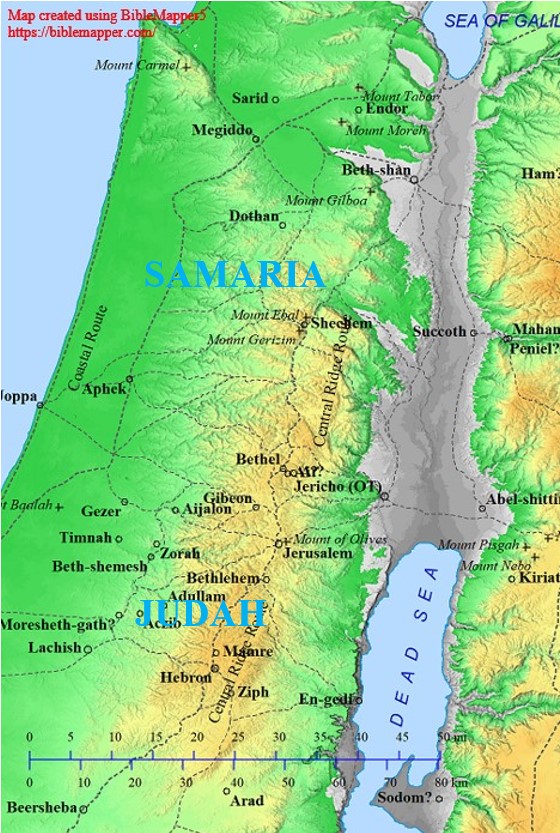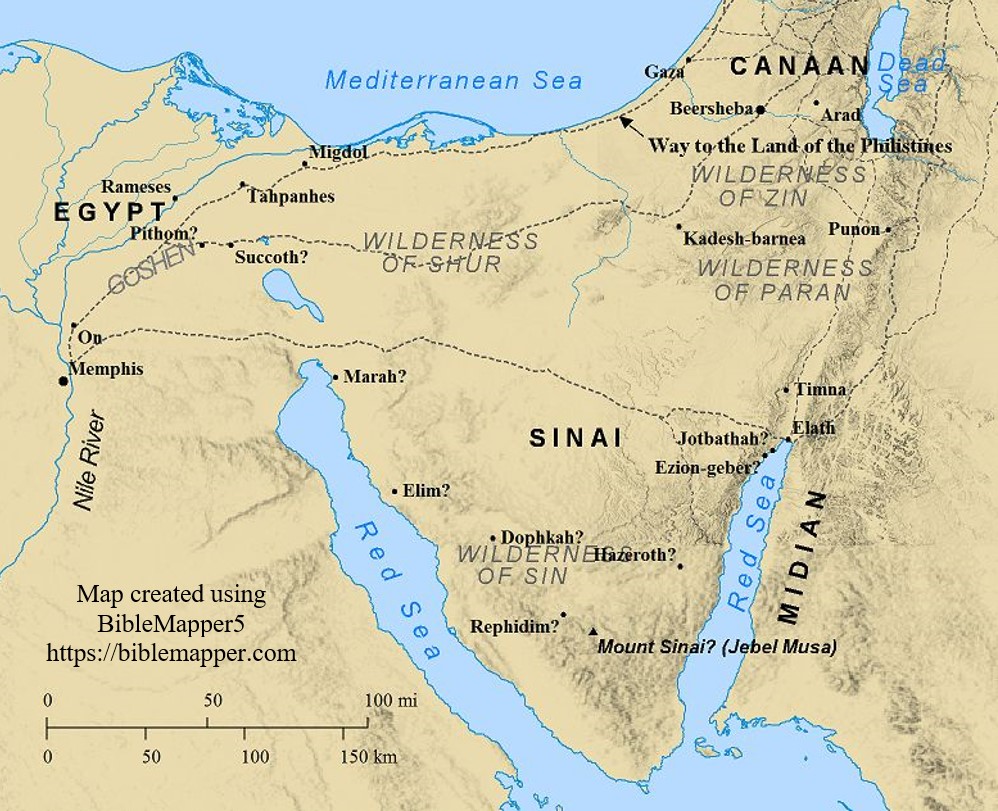Recap: (see Genesis 35b) We have followed the events leading up to Israel (Jacob) and his twelve sons settling in the land of Canaan.
Read Genesis 37:1-36
1 Jacob lived in the land where his father had stayed, the land of Canaan.
2 This is the account of Jacob’s family line.
Joseph, a young man of seventeen, was tending the flocks with his brothers, the sons of Bilhah and the sons of Zilpah, his father’s wives, and he brought their father a bad report about them.
Who specifically was he assigned to?
Dan, Napthali, Gad, and Asher – Genesis 35:25-26
Now look at the last line of verse 2: would you read that to say that the brothers were bad, or was Joseph’s report bad?
3 Now Israel loved Joseph more than any of his other sons, because he had been born to him in his old age; and he made an ornate robe for him. 4 When his brothers saw that their father loved him more than any of them, they hated him and could not speak a kind word to him.
Joseph was the last to be born while the family were with Laban. He was now seventeen; the others were in their twenties. He might have been accepted by them had he not been so obviously his father’s favourite (as well as being a tell-tale!).
5 Joseph had a dream, and when he told it to his brothers, they hated him all the more.
Do you think Joseph was even aware that his brothers really hated him?
6 He said to them, ‘Listen to this dream I had:
We need to remember that these were actual dreams that Joseph had. They weren’t made up stories. Where then did these dreams originate? Were they actually prophetic?
7 we were binding sheaves of corn out in the field when suddenly my sheaf rose and stood upright, while your sheaves gathered round mine and bowed down to it.’
8 His brothers said to him, ‘Do you intend to reign over us? Will you actually rule us?’ And they hated him all the more because of his dream and what he had said.
Was it Joseph that interpreted the dream?
9 Then he had another dream, and he told it to his brothers. ‘Listen,’ he said, ‘I had another dream, and this time the sun and moon and eleven stars were bowing down to me.’
10 When he told his father as well as his brothers, his father rebuked him and said, ‘What is this dream you had? Will your mother and I and your brothers actually come and bow down to the ground before you?’
Again, who interpreted the dream?
Dreams were considered important, and as these were obviously prophetic they were bound to provoke a reaction.
11 His brothers were jealous of him, but his father kept the matter in mind.
The reaction of the brothers was exactly what might be expected. But after the initial shock, Israel kept thinking about the dream and what it might mean. He himself, as Jacob, had had prophetic dreams too (Genesis 28:12, 31:11).
12 Now his brothers had gone to graze their father’s flocks near Shechem, 13 and Israel said to Joseph, ‘As you know, your brothers are grazing the flocks near Shechem. Come, I am going to send you to them.’
‘Very well,’ he replied.
14 So he said to him, ‘Go and see if all is well with your brothers and with the flocks, and bring word back to me.’ Then he sent him off from the Valley of Hebron.
Whether as a result of the report Joseph had given, or because of the reaction to the dreams, we don’t know. But Joseph was now at home, the flocks had been combined, and all the other brothers were together.
When Joseph arrived at Shechem, 15 a man found him wandering around in the fields and asked him, ‘What are you looking for?’
16 He replied, ‘I’m looking for my brothers. Can you tell me where they are grazing their flocks?’
17 ‘They have moved on from here,’ the man answered. ‘I heard them say, “Let’s go to Dothan.”’
So Joseph went after his brothers and found them near Dothan.
Shechem was about 25 miles north up the main ridge route from Hebron, and Dothan another 10 miles further on from there. With such large numbers of animals, the quest for grass meant that as time went by the flocks and their shepherds would have to travel quite large distances.
 Map011
Map011
This meant that after several weeks Israel felt he needed to hear if everything was ok.
18 But they saw him in the distance, and before he reached them, they plotted to kill him.
The fact that the ‘Ridge Route’ was situated on the highest ground meant that people travelling on it could be seen from a long way away. For the shepherds that was good news: for defence of their flocks, but also for the opportunity to trade. Fresh lamb could always be used to barter with travelling merchants.
For Joseph it was with relief that he made out their camp from a distance. But his brothers were not pleased to see him. The dreams and their implication had made a much greater impact than they were prepared to admit.
19 ‘Here comes that dreamer!’ they said to each other. 20 ‘Come now, let’s kill him and throw him into one of these cisterns and say that a ferocious animal devoured him. Then we’ll see what comes of his dreams.’
Do you see a similar response when it became obvious to the leaders of Jesus’ day that he had come to rule over them? (John 10:33, 18:33-35)
21 When Reuben heard this, he tried to rescue him from their hands. ‘Let’s not take his life,’ he said. 22 ‘Don’t shed any blood. Throw him into this cistern here in the wilderness, but don’t lay a hand on him.’ Reuben said this to rescue him from them and take him back to his father.
Reuben, as firstborn was responsible for looking after his brothers, even though he had most reason for being jealous of Joseph. He too would like to punish him, but killing him was a step too far.
23 So when Joseph came to his brothers, they stripped him of his robe – the ornate robe he was wearing – 24 and they took him and threw him into the cistern. The cistern was empty; there was no water in it.
Why did the brothers specifically strip Joseph of his robe? Did it emphasise the fact that he was the chosen one, one who would one day wear royal robes?
 Map010
Map010
25 As they sat down to eat their meal, they looked up and saw a caravan of Ishmaelites coming from Gilead. Their camels were loaded with spices, balm and myrrh, and they were on their way to take them down to Egypt.
God promised that Ishmael (Abraham’s first son – by Hagar) would prosper and become a great nation (Genesis 17:20). His mother was Egyptian, He married an Egyptian, and he settled on the borders between Egypt and Canaan. The Ishmaelites were thus ideally set up to become traders between Egypt and Mesopotamia.
26 Judah said to his brothers, ‘What will we gain if we kill our brother and cover up his blood? 27 Come, let’s sell him to the Ishmaelites and not lay our hands on him; after all, he is our brother, our own flesh and blood.’ His brothers agreed.
28 So when the Midianite merchants came by, his brothers pulled Joseph up out of the cistern and sold him for twenty shekels of silver to the Ishmaelites, who took him to Egypt.
The Midianites (sometimes translated as Medanites) came from Midian (or Medan) who were younger sons of Abraham (Genesis 25:2). Perhaps as they were related the Ishmaelites may have joined forces with them.
Can you find any parallels with Matthew 26:14-15?
Note that it was at the suggestion of Judah, and that Reuben was not consulted, as he obviously wanted to rescue Joseph. Judah too had second thoughts about killing him, but he thought that selling him as a slave in Egypt was a brilliant solution.
29 When Reuben returned to the cistern and saw that Joseph was not there, he tore his clothes. 30 He went back to his brothers and said, ‘The boy isn’t there! Where can I turn now?’
It was obvious to Reuben that the others had disposed of Joseph. Probably he was then told what they had done, so that he would be comforted, but also so that he would join in the deception that followed.
31 Then they got Joseph’s robe, slaughtered a goat and dipped the robe in the blood. 32 They took the ornate robe back to their father and said, ‘We found this. Examine it to see whether it is your son’s robe.’
This has echoes of a time when Israel (Jacob) joined in the slaughter of a goat in order to deceive his own father (Genesis 27:6-19).
33 He recognised it and said, ‘It is my son’s robe! Some ferocious animal has devoured him. Joseph has surely been torn to pieces.’
34 Then Jacob tore his clothes, put on sackcloth and mourned for his son many days. 35 All his sons and daughters came to comfort him, but he refused to be comforted. ‘No,’ he said, ‘I will continue to mourn until I join my son in the grave.’ So his father wept for him.
Joseph had been Israel’s pride and joy – the firstborn of his beloved wife Rachel who had died so close to home. True he had baby Benjamin who would grow to be a consolation for him, but for now he was truly devastated.
36 Meanwhile, the Midianites sold Joseph in Egypt to Potiphar, one of Pharaoh’s officials, the captain of the guard.
It is hard to imagine that the Midianites had not heard about Jacob/Israel. If they weren’t told, they could have probably guessed that Joseph was related to the brothers and therefore also a descendent of Abraham. He was no ordinary slave, and could probably be worth more if sold to the right buyer.
Spices, Balm and Myrrh (v25) were luxury items, and possibly Potiphar (or his wife) were people they regularly dealt with.
That may be so, but at the same time the purposes of God were all the time weaving a plan for the future of the whole nation of Israel.
How much are circumstances directed by God, or does God simply use circumstances to his own ends?





